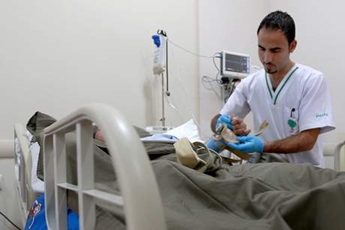One in five patients in long-term intensive care is a young man crippled for life in a car crash. Doctors have described the heartbreak of providing lifetime support for victims with alert minds trapped in the “physical prison of a non-functioning body”.
And they have renewed calls for tougher action to curb what one described as a “pandemic” of excessive speed, reckless driving and systematic flouting of basic road safety precautions.
“Motor vehicle accident patients in some sense are the saddest cases, because they are young people who were in the prime of their lives. But one unfortunate instant has meant they have become completely dependent on society to support even their most basic life functions,” said Ali Hashemi, director of Amana Healthcare, a care facility in Al Ain for the chronically ill.
“If as a youngster you have been exposed to illness and tragedy related to reckless driving and speeding it leaves an impact. It matters for people to know these stories.”
When the 80-bed facility is full, about one in five patients will be victims of road traffic accidents. At ProVita, another long-term care provider with 50 beds in Al Ain and 36 in Abu Dhabi, 18 per cent of patients are car-crash victims.
“The children at our facility with profound genetic disorders – they have never known another life,” Mr Hashemi said.
“Our elderly patients have lived long lives and require care and support in later stages when they fall ill – a natural progression of life.”
But road traffic victims were the most heart-wrenching, he said. Some have suffered severe head injuries causing brain damage, and a large number have suffered a high-cervical spine fracture resulting in life-long paralysis.
“Some of these patients are as intellectually intact as they were the split second before the crash,” he said.
“Some of these young people are essentially locked in the physical prison of a non-functioning body. Yet the mind is still young and vibrant and this can be quite heartbreaking. You can only imagine the impact on their psychological wellbeing and the wellbeing of their families.”
Many suffer depression. Others contemplate suicide but do not have the physical ability to carry out their darkest thoughts, he said.
Mr Hashemi believes the Government is committed to implementing measures to reduce road traffic accidents.
However, he said, speeding drivers were still a primary factory in many crashes.
Mr Hashemi, who is from the United States, called for more road safety awareness and education.
“You don’t want to put these patients on display but you want people to understand what can happen when you drive recklessly and to an extent that awareness is not there,” he said.
Mike Davis, the chief operating officer of ProVita, said reckless driving was the cause of most road traffic accidents.
“They speed, they text and drive. There seems to be an impatience to the drivers here that put people at risk.”
Stronger laws to reflect the lifetime of devastation a traffic accident can cause would result in fewer crashes, he said.
“We need better, harder laws. We need more education and more public service enforcement on high speeding, driving and texting, driving without a seat belt and not putting a child in a safety seat.
“Unless the punishments are properly enforced then I think it is very, very difficult for things to get any better.
“Anyone who has to drive between Abu Dhabi and Dubai realizes the problem is pandemic.”
Mr Davis said most of the car-crash victims at the two ProVita sites suffered from what he refers to as “closed head trauma”, which results in severe cognitive impairment.
Many have had bleeding on the brain, damage to the brain cells and cervical spine fracture, and some are paralyzed for life. As at Amana, the majority are young men who will never recover from their injuries. Mr Davis believes road traffic accidents are placing an unnecessary strain on long-term care facilities.
Eighteen per cent was “a significant number”, he said. “And while the human factor is devastating, a significant factor is the impact on resources. These patients need to be cared for for the rest of their lives.”
According to the Health Authority Abu Dhabi, road traffic accidents account for 10.4 per cent of all deaths. They are the leading cause of death among young males aged between 13 and 15.
Of the 514 injury deaths in the emirate last year, 303 were related to a road traffic incident. It means somebody died every 28 hours last year because of a road accident.



